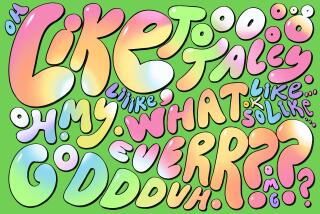‘How to Lose Your Brooklyn Accent’ : Like, Da Way He Wuz Talkin’ Din’t Sound So T’riffic, Y’Know?
- Share via
NEW YORK — When Alan Rodin graduated from Brooklyn’s Lafayette High School and set out to become a speech major in college, he ran into a slight problem--like, uh, da way he wuz sayin’ woids din’t sound too t’riffic, y’know?
“I had a very heavy Brooklynese accent, like everyone else in the school,” Rodin said. “If I had said ‘wah-ter’ instead of ‘wad-uh,’ I would’ve gotten my face punched in.”
But Rodin, 38, silenced his origins and has made it his mission in life to liberate others from the peculiar pronunciations and vivid vowels of their native borough.
The speech course that Rodin teaches at Brooklyn College, known informally as “How to Lose Your Brooklyn Accent,” is one of the most popular classes on campus. Pam Goldberg, 23, said she took the course last summer because she grew up in Rockaway Beach, Queens, and “the grammar there is not the greatest. The way I spoke was perfectly acceptable, but I didn’t want that to be the way I spoke for the rest of my life.”
Rodin worked with her evenings and weekends, at one point even visiting her orthodontist. “He went over and over it until you got it right,” said Goldberg, who achieved her goal when an Iowa woman interviewed her for a job and could not tell she was a New Yorker.
Long Island to New Jersey
Geographically speaking, the accent known as Brooklynese stretches from Long Island to New Jersey. But the label stuck after a generation of Grade-B movies and sitcoms, from “Bowery Boys” to “The Honeymooners,” portrayed gangsters, punks and buffoons as cigar-chompin’ Brooklynites, the kind of guys who rooted for Da Bums from Flatbush.
While Southern accents are viewed as charming, Rodin complained, the stereotypical Brooklynite is illiterate. He pointed to television’s Fonzie as a case in point.
“Is the Fonz supposed to be a Rhodes scholar, or is he supposed to be a high-school dropout character?” he asked. “What does society do to make someone sound illiterate? Give them a Brooklyn accent. Professionally and socially, people who speak Brooklynese are looked down upon as socially inferior.”
Margaret Mannix Flynn, a Brooklyn College speech instructor who taught Rodin when he was a student in the 1960s, said Brooklynese is an amalgam of at least 28 dialects spoken here over the last two centuries. From New England farmers to Irish, Italians and Germans, from blacks to Eastern Europeans speaking Russian, Polish and Yiddish, each immigrant group shaped the accent in different ways, she said.
The result is a native tongue full of dropped g’s (readin’ and writin’), dropped r’s (mutha and fatha), mangled th’s (tanks a lot), muffled t’s (a boddle a Bud) and other unique inflections. “In New York, we speak too rapidly,” Flynn said. “We tend to telescope words: ‘D’ju eat? No, d’ju?’ ”
Rodin shed his Noo Yawk accent while attending graduate school at Northwestern University near Chicago, where, he said, “all these Ivy League kids knew what to wear to the dean’s tea.” He said the Midwestern accent comes closest to what professionals call Standard American Articulation, the nonregional speech preferred by newscasters.
But in the classroom, addressing those he calls “dems and dosers,” Rodin can drop consonants with the best of ‘em.
One recent evening, Rodin gave an animated performance during his speech class at Kingsborough Community College, whose modern Brooklyn campus covers the eastern tip of Manhattan Beach and boasts its own private beach and lifeguard. The students ranged from earnest teen-agers to a middle-aged truck driver to recent immigrants from Haiti, Trinidad, Argentina and Greece.
Striding around the room in a red T-shirt, blue sweat pants and white Reeboks, Rodin lapsed into his native lingo: “Awfissa, wuz I speedin’? . . . What’s the numba afta 19? Twenny! My address is Twel Twenny-Fi Ocean Parkway. That’s how I said it for years.”
‘Dawg’ and ‘Paw’
Then it’s the students’ turn. Rodin scribbled “dog” on the blackboard and asks the class to say it. “DAWG!” He wrote “poor” and turned around. “PAW!” Shaking his head, Rodin recited in exaggerated King’s English: “Pa will pour water on the poor dog’s paw.”
“Nobody in Brooklyn talks like that, unless you’re a speech teacher,” one student objected.
Others also were skeptical about their supposed handicap. “I don’t care,” Debbie said. “I come from Brooklyn. This is the way I speak. And as long as you can understand me, that’s all I know.”
But Al, a gravelly voiced man with a mustache, disagreed. “I think to get ahead in life, I’m gonna have to change my speech,” he said.
Kevin Brennan, 21, an accounting student, said he signed up for the course after struggling through job interviews in Manhattan. “You have to be able to speak well, as opposed to saying, ‘Uh, uh, uh, I dunno, maybe,’ ” he said. “When you’re dealing with millions of dollars and you drop to your level of speaking, people start to look at you: ‘What’s with this kid?’ ”
Rodin has been through this debate before; he knows how to persuade the skeptics: “ ‘Ay! Ya got busted lass week? I’ll handle yer case!” he declared in rasping Brooklynese. Then he repeated the same sentence in the high-sounding tones of a British barrister. “Which lawyer would you hire?” he asked. Laughter indicated that the verdict was unanimous.
Lest anyone forget that good public speaking is more than a matter of precise pronunciation, Rodin offered his class one last piece of advice: “Don’t drink soda and burp.”
More to Read
Sign up for Essential California
The most important California stories and recommendations in your inbox every morning.
You may occasionally receive promotional content from the Los Angeles Times.












